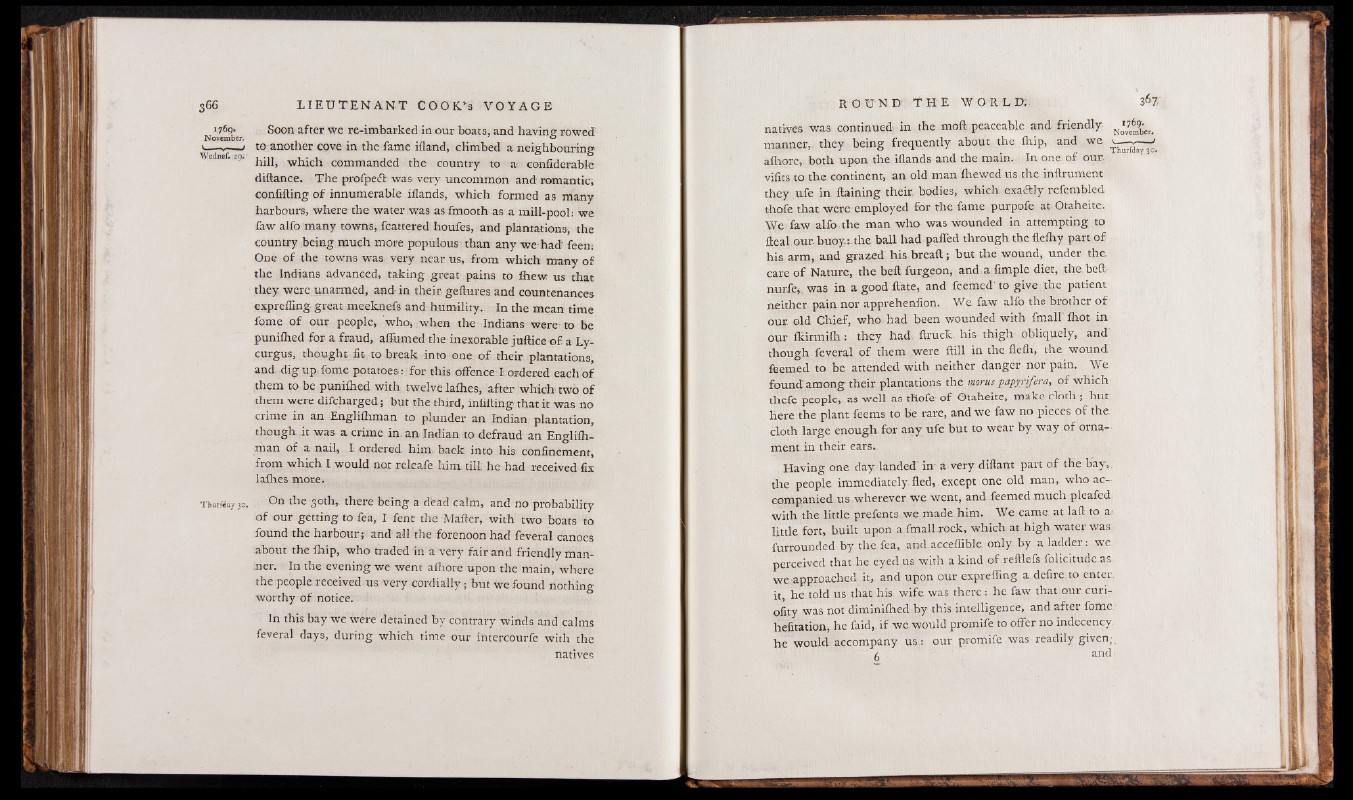
1769. Soon after we re-imbarked in our boats, and having: rowed'
November. m 0
y— v——t to another cove in the fame Hland, climbed a neighbouring
e ’ 29’ hill, which commanded the country to a- eonfiderable
diftance. The profpedf was very uncommon and romantic;
confifting of innumerable iflands, which formed as many
harbours, where the water was as fmooth as a mill-pool: we
faw alfo many towns, fcattered houfes, and plantation», the
country being much more populous than any we had feem
One of the towns was. very near us, from which many of
the Indians advanced, taking great pains to fhew us that
they were unarmed, and in their geftures and countenances
exprelling great meeknefs and humility. In the mean time
fome of our people, who, when the Indians were to be
punilhed for a fraud, affirmed the inexorable juft ice o f a Ly-
curgus, thought fit to break into one of their plantations,
and dig up.fome potatoes: for this offence I ordered each of
them to be punilhed with twelve laflies, after which two of
them were difcharged; but the third, infilling that it was no
crime in an Englifhman to plunder an Indian plantation,
though it was a crime in an. Indian to defraud an Englifh-
man of a nail, I ordered him. back into his confinement,
from which I would not releafe him till he had received fix
lafh.es more:
Thursday 30. On the 30th, there being a dead calm, and no probability
of our getting to fea, I fent the Mailer, with two boats to
found the harbour ; and all the forenoon had feveral canoes
about the fhip, who traded in a very fair and friendly manner.
In the evening we went afhore upon the main, where
the people received us very cordially; but we found nothing
worthy of notice.
In this bay we were detained by contrary winds and calms
feveral days, during which time our intercourfe with the
natives
natives was continued in the moft peaceable and friendly
manner, they being frequently about the Ihip, and we
alhore, both upon the iflands and the main. In one of our
vifits to the continent, an old man Ihewed us the inftrument
they .ufe in ftaining their bodies, which exactly refembled
thofe that were: employed for the fame purpofe at Otaheite.
We faw alfo the man who was wounded in attempting to
fteal our. buoy.cthe ball had paGed through the flefliy part of
his arm, and grazed his bread; but the wound, under the.
care of Nature, the belt furgeon, and a fimple diet, the belt
nurfe, was in a goodHate, and feemed to give the patient
neither, pain.nor apprehenfion. We. faw alfo the brother of
our old Chief, who had been wounded with fmall fliot in
our ikirmilh: they had. ft-ruck. his thigh obliquely, and
though feveral of them were ftill in the flefh, the wound
feemed to be attended with neither danger nor pain. We
found among their plantations the mortis papyrifera, of which
thefe people, as well as thofe of Otaheite, make cloth ; but
here the plant feems to be rare, and we faw no pieces of the
cloth large enough for any ufe but to wear by way of ornament
in their ears.
Having one day landed' in' a very diflant part of the bay,
the people immediately fled, .except one old man, who accompanied
us wherever we. went, and.feemed.much pleafed:
with the little prefents we made. him. We came at laft to a-
little fort, built upon a fmall rock, which at high water was
furrounded by the fea, and.acceflible only by a ladder: we.
perceived that he eyed us with a kind of reftlefs folicitude as,
we approached it, and upon our exprefling a defire, to enter
it, he told us that his wife was there : he faw that our curi-
ofity was not diminilhed by this intelligence, and after fome
hefitation, he faid, if we would promife to offer no indecency,
he would accompany u s : our promife was readily given;
6 and’